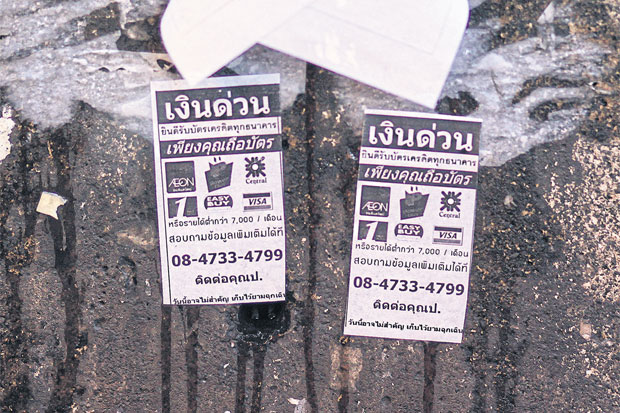
The Finance Ministry has proposed using Section 44 powers to crack down on loan sharks who charge higher interest than the law allows, says finance permanent secretary Somchai Sujjapongse.
The ministry will also instruct the Revenue Department to investigate whether loan sharks who charge relatively high interest have paid income tax correctly, Mr Somchai said without elaborating on how Section 44 would be used.
The proposal is part of state agencies' new effort to rescue low-income earners from underground lenders after recent measures such as nanofinancing failed to root out the problem.
Even though the Civil and Commercial Code bars non-financial institutions and individual lenders from charging annual interest rates above 15%, loan sharks still impose rates up to 20% a day because of insufficient law enforcement.
The Fiscal Policy Office recently estimated 600,000 households borrow from loan sharks. Some 1.34 million of 20 million total Thai households are ineligible to borrow from formal lenders.
Mr Somchai said underground loan operators who want to do business legally can seek nanofinance or picofinance licences.
Nanofinance operators are credit lenders only for occupational purposes with a lending maximum of 100,000 baht per borrower and a ceiling interest rate of 36% a year. Picofinance operators lend for general purposes and are limited to lending 50,000 baht per borrower at a maximum rate of 36% a year.
The Finance Ministry has instructed two state-controlled banks -- the Government Savings Bank and the Bank for Agriculture and Agricultural Cooperatives -- to set up a permanent unit tasked with solving underground lending problems.
Meanwhile, the Finance Ministry will ask the Agriculture and Cooperatives Ministry to transfer regulation and supervision of thrift and credit cooperatives to the former, Mr Somchai said. The move is to allow all financial-related institutions to be governed by the Finance Ministry, as happened recently with the transfer of supervision of the Office of the Insurance Commission from the Commerce Ministry to the Finance Ministry.
In addition to thrift and credit, the other types of cooperatives are agricultural, land settlement, fisheries, consumer, service and credit unions.
The Agriculture and Cooperatives Ministry reports as of Jan 1 this year, there are 8,270 cooperatives in the country, with 6,851 operational. There are 1,496 thrift and credit cooperatives, of which 1,397 still function, 71 are under liquidation and 28 have not begun operations. Some 11.5 million people are members of cooperatives and 2.88 million of those are members of thrift and credit cooperatives.
In 2015, all cooperatives had combined cash of 2.23 trillion baht, with 82.05% in thrift and credit cooperatives and 14.2% at agricultural cooperatives. Borrowing accounted for 56.9% of their total money, followed by deposits at 34.3%.
A source at the Finance Ministry said thrift and credit cooperatives are not under the Bank of Thailand's supervision and some have been involved in fraud. For example, Klongchan Credit Union Cooperative was reportedly involved embezzlement worth billions of baht, endangering thousands of retail deposits as their is no law to protect their money.